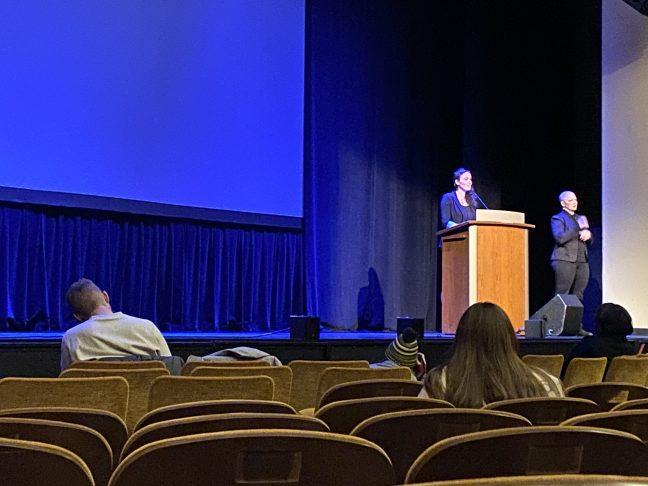Megan Phelps-Roper spoke about how Twitter allowed her to grow into her own beliefs and leave the Westboro Baptist Church during a Wisconsin Union Directorate distinguished lecture event Tuesday night.
Phelps-Roper was born and raised in the heart of the Westboro Baptist Church. Her grandfather was the church’s founder and her mother was its most influential member.
Because of this, Phelps-Roper was taught the beliefs of the Westboro Baptist Church from a young age and even began protesting for the church around four-years-old.
“This was life as I’d always known it,” Phelps-Roper said. “Before I could read, I was learning why God despised gays, Jews, and everyone who wasn’t part of our church. Before I started kindergarten, I was standing on public sidewalks holding signs with messages like ‘gays are worthy of death.’”
Phelps-Roper said she continued to spread the teachings of the Westboro Baptist Church, eventually becoming the spokesperson for the church’s social media accounts.
Twitter was a new way for Phelps-Roper to interact with the communities the church targeted. Phelps-Roper said it was the perfect way to get the message of the Westboro Baptist Church to a broader audience.
“Like a gift from God Almighty Himself, along came Twitter … Twitter seemed perfect,” Phelps-Roper said. “A tool that was easy to use and so effective at getting attention. It required so little effort to find and attack Westboro’s targets.”
While Twitter allowed her to attack the Westboro Baptist’s targets, Phelps-Roper said she was shocked at the reception from people she targeted. Phelps-Roper said the kindness and reason some people showed her led her to re-evaluate her position against the very people she was attacking.
Phelps-Roper said her conversations with the communities she was taught to hate led her to question the morality of the members of the Westboro Baptist Church and their overall belief system. When she brought her questions to church leaders, she was shut down.
“This, the undeniable understanding that we were human, invaluable, and not divine,” Phelps-Roper said. “This was the beginning of the end for me.”
Through social media, Phelps-Roper said she was able to see the humanity in others and empathize with that. Eventually, social media allowed Phelps-Roper to leave the Westboro Baptist Church after coming to the realization she no longer agreed with the church’s teachings.


